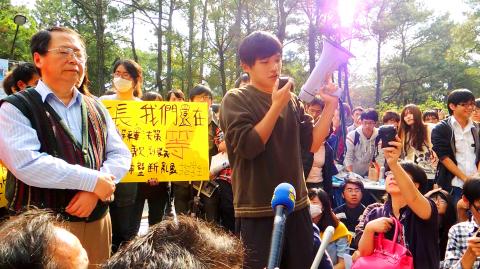National Tsing Hua University student Chen Wei-ting (陳為廷) yesterday apologized for his attitude when speaking to Minister of Education Chiang Wei-ling (蔣偉寧) at a legislative meeting on Monday, and urged the public to focus on the movement against media monopolization.
“Some people may think I had a bad attitude that day. Some people may think that my attitude was okay. Whether I meant it or not, certainly some people’s feelings have been hurt by the way I talked,” Chen told a student rally on the university’s campus in Hsinchu City.
“For those whose feelings have been hurt, I would like to sincerely apologize to them, and apologize to our school president,” he said.

Photo: Wang Chin-yi, Taipei Times
“From now on, can we stop arguing about the issue of attitude?” he asked, after bowing three times.
“We are here, because we are against media monopoly. We are here, because we are against Chinese intervention in our freedom of the press. We are here to defend the bottom line in freedom of the media,” he said.
Chen’s apology and remarks drew a round of applause and cheers from his peers.
He said the campaign against media monopoly would continue regardless of the incident.
When invited to take part in a legislative meeting on Monday, Chen accused the minister of being a liar and a hypocrite who does not know remorse.
On Tuesday, the Chinese-language United Daily News devoted its front page and another full page inside to criticizing Chen as being ill-mannered.
The reports triggered a wide debate on whether it was appropriate for a university student to make such comments toward a minister in the legislature.
The university immediately issued a press release condemning Chen’s attitude and apologized on behalf of Chen, which led to yet another wave of debates on whether it was appropriate for the university to do so.
Hundreds of Tsing Hua students staged rallies on campus on Wednesday, while as many as 95 faculty members signed a petition protesting the university’s statement of apology.
On Thursday, Tsing Hua chief secretary Chien Chen-fu (簡禎富) acknowledged that the school misjudged the situation in issuing the apology.
He was quoted by the Chinese-language Liberty Times (the Taipei Times’ sister newspaper) as saying that he asked his secretary to draft the statement after only seeing the headline in the United Daily News.
Students launched the campaign against media monopoly after learning that a consortium including Want Want China Times Group (旺旺中時集團) chairman Tsai Eng-meng (蔡衍明) was buying Next Media Group’s (壹傳媒集團) four media outlets in Taiwan.
They said they oppose control of the mass media being concentrated in the hands of a few conglomerates and urged the government to scrutinize the transaction.

Tropical Storm Gaemi strengthened into a typhoon at 2pm yesterday, and could make landfall in Yilan County tomorrow, the Central Weather Administration (CWA) said yesterday. The agency was scheduled to issue a sea warning at 11:30pm yesterday, and could issue a land warning later today. Gaemi was moving north-northwest at 4kph, carrying maximum sustained winds near its center of up to 118.8kph and gusts of 154.8kph. The circumference is forecast to reach eastern Taiwan tomorrow morning, with the center making landfall in Yilan County later that night before departing from the north coast, CWA weather forecaster Kuan Shin-ping (官欣平) said yesterday. Uncertainty remains and

SEA WARNING LIKELY: The storm, named Gaemi, could become a moderate typhoon on Wednesday or Thursday, with the Taipei City Government preparing for flooding A tropical depression east of the Philippines developed into a tropical storm named Gaemi at 2pm yesterday, and was moving toward eastern Taiwan, the Central Weather Administration (CWA) said. Gaemi could begin to affect Taiwan proper on Tuesday, lasting until Friday, and could develop into a moderate typhoon on Wednesday or Thursday, it said. A sea warning for Gaemi could be issued as early as Tuesday morning, it added. Gaemi, the third tropical storm in the Pacific Ocean this typhoon season, is projected to begin moving northwest today, and be closest to Taiwan on Wednesday or Thursday, the agency said. Today, there would likely

DISRUPTIONS: The high-speed rail is to operate as normal, while several airlines either canceled flights or announced early departures or late arrivals Schools and offices in 15 cities and counties are to be closed today due to Typhoon Gaemi, local governments announced last night. The 15 are: Taipei, New Taipei City, Taoyuan, Tainan, Keelung, Hsinchu and Kaohsiung, as well as Yilan, Hualien, Hsinchu, Miaoli, Chiayi, Pingtung, Penghu and Lienchiang counties. People should brace for torrential rainfall brought by the storm, with its center forecast to make landfall on the east coast between tonight and tomorrow morning, the Central Weather Administration (CWA) said. The agency issued a sea warning for the typhoon at 11:30pm on Monday, followed by a land warning at 11:30am yesterday. As of

CASUALTY: A 70-year-old woman was killed by a falling tree in Kaohsiung as the premier warned all government agencies to remain on high alert for the next 24 hours Schools and offices nationwide are to be closed for a second day today as Typhoon Gaemi crosses over the nation, bringing torrential rain and whipping winds. Gaemi was forecast to make landfall late last night. From Tuesday night, its outer band brought substantial rainfall and strong winds to the nation. As of 6:15pm last night, the typhoon’s center was 20km southeast of Hualien County, Central Weather Administration (CWA) data showed. It was moving at 19kph and had a radius of 250km. As of 3pm yesterday, one woman had died, while 58 people were injured, the Central Emergency Operation Center said. The 70-year-old